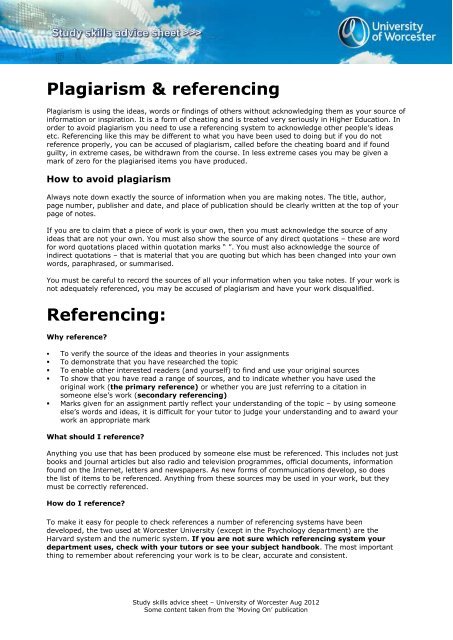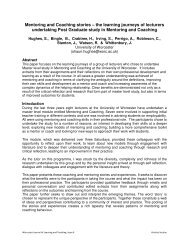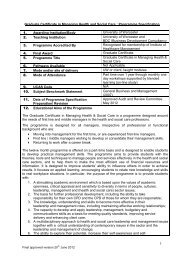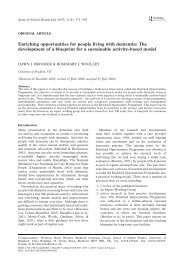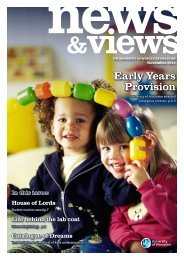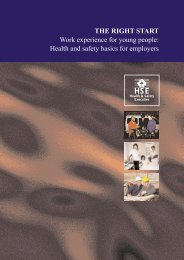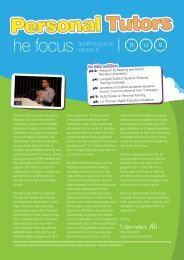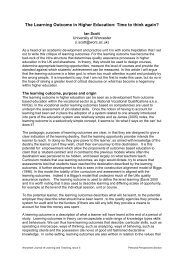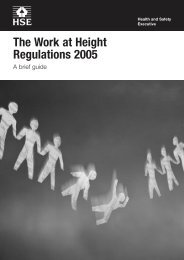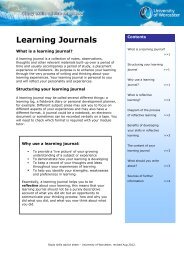Plagiarism & referencing Referencing: - University of Worcester
Plagiarism & referencing Referencing: - University of Worcester
Plagiarism & referencing Referencing: - University of Worcester
You also want an ePaper? Increase the reach of your titles
YUMPU automatically turns print PDFs into web optimized ePapers that Google loves.
<strong>Plagiarism</strong> & <strong>referencing</strong><br />
<strong>Plagiarism</strong> is using the ideas, words or findings <strong>of</strong> others without acknowledging them as your source <strong>of</strong><br />
information or inspiration. It is a form <strong>of</strong> cheating and is treated very seriously in Higher Education. In<br />
order to avoid plagiarism you need to use a <strong>referencing</strong> system to acknowledge other people’s ideas<br />
etc. <strong>Referencing</strong> like this may be different to what you have been used to doing but if you do not<br />
reference properly, you can be accused <strong>of</strong> plagiarism, called before the cheating board and if found<br />
guilty, in extreme cases, be withdrawn from the course. In less extreme cases you may be given a<br />
mark <strong>of</strong> zero for the plagiarised items you have produced.<br />
How to avoid plagiarism<br />
Always note down exactly the source <strong>of</strong> information when you are making notes. The title, author,<br />
page number, publisher and date, and place <strong>of</strong> publication should be clearly written at the top <strong>of</strong> your<br />
page <strong>of</strong> notes.<br />
If you are to claim that a piece <strong>of</strong> work is your own, then you must acknowledge the source <strong>of</strong> any<br />
ideas that are not your own. You must also show the source <strong>of</strong> any direct quotations – these are word<br />
for word quotations placed within quotation marks “ ”. You must also acknowledge the source <strong>of</strong><br />
indirect quotations – that is material that you are quoting but which has been changed into your own<br />
words, paraphrased, or summarised.<br />
You must be careful to record the sources <strong>of</strong> all your information when you take notes. If your work is<br />
not adequately referenced, you may be accused <strong>of</strong> plagiarism and have your work disqualified.<br />
<strong>Referencing</strong>:<br />
Why reference?<br />
• To verify the source <strong>of</strong> the ideas and theories in your assignments<br />
• To demonstrate that you have researched the topic<br />
• To enable other interested readers (and yourself) to find and use your original sources<br />
• To show that you have read a range <strong>of</strong> sources, and to indicate whether you have used the<br />
original work (the primary reference) or whether you are just referring to a citation in<br />
someone else’s work (secondary <strong>referencing</strong>)<br />
• Marks given for an assignment partly reflect your understanding <strong>of</strong> the topic – by using someone<br />
else’s words and ideas, it is difficult for your tutor to judge your understanding and to award your<br />
work an appropriate mark<br />
What should I reference?<br />
Anything you use that has been produced by someone else must be referenced. This includes not just<br />
books and journal articles but also radio and television programmes, <strong>of</strong>ficial documents, information<br />
found on the Internet, letters and newspapers. As new forms <strong>of</strong> communications develop, so does<br />
the list <strong>of</strong> items to be referenced. Anything from these sources may be used in your work, but they<br />
must be correctly referenced.<br />
How do I reference?<br />
To make it easy for people to check references a number <strong>of</strong> <strong>referencing</strong> systems have been<br />
developed, the two used at <strong>Worcester</strong> <strong>University</strong> (except in the Psychology department) are the<br />
Harvard system and the numeric system. If you are not sure which <strong>referencing</strong> system your<br />
department uses, check with your tutors or see your subject handbook. The most important<br />
thing to remember about <strong>referencing</strong> your work is to be clear, accurate and consistent.<br />
Study skills advice sheet – <strong>University</strong> <strong>of</strong> <strong>Worcester</strong> Aug 2012<br />
Some content taken from the ‘Moving On’ publication
Further information<br />
This Study Advice Sheet has been<br />
produced by Student Services at<br />
UW.<br />
We support student learning across<br />
the <strong>University</strong> through the<br />
publication <strong>of</strong> materials such as<br />
these.<br />
Other study advice sheets that you<br />
may find useful include:<br />
Essay writing<br />
Learning at university<br />
Learning journals<br />
Making oral presentations<br />
Minimising stress<br />
Organising yourself<br />
Reading efficiently<br />
Revision and exam skills<br />
Study at a distance<br />
Taking notes<br />
Using feedback to improve your<br />
work<br />
What does the question mean?<br />
Working in groups<br />
Writing reports<br />
All study advice sheets are available<br />
to view and download on the<br />
following website:<br />
www.worcester.ac.uk/studyskills<br />
or you can follow the links from<br />
your SOLE page.<br />
You may also find it useful to check<br />
out the ‘Moving On’ pack,<br />
accessible from the link on your<br />
SOLE page.<br />
‘Moving On’ is a study skills<br />
package specifically designed to<br />
help you prepare for Higher<br />
Education & to become a successful<br />
student.<br />
Contact: studyskills@worc.ac.uk<br />
<strong>Referencing</strong> systems – an overview<br />
In the Harvard system you include the author’s surname and year <strong>of</strong><br />
publication in brackets within the body <strong>of</strong> your work (you add the page<br />
number if using a quote). At the end <strong>of</strong> your essay you make a<br />
reference list <strong>of</strong> the sources you have used. You can also add a<br />
bibliography at the end <strong>of</strong> your assignment which will list other sources<br />
<strong>of</strong> information that you have used as background, but have not drawn<br />
directly from. For more detailed guidance see the online Harvard<br />
<strong>Referencing</strong> Guide available on the study skills website<br />
(www.worcester.ac.uk/studyskills) or your tutor.<br />
In the numeric system you use a number after each quote or<br />
paraphrase, and then give the details <strong>of</strong> where to find it in a reference<br />
list (endnote list) at the end <strong>of</strong> your essay. Your reference list will only<br />
refer to the sources that you have actually cited. You can also add a<br />
bibliography at the end <strong>of</strong> your assignment which will list other sources<br />
<strong>of</strong> information that you have used as background, but have not drawn<br />
directly from. For more detailed guidance see online Numerical<br />
<strong>Referencing</strong> Guide available on the study skills website<br />
(www.worcester.ac.uk/studyskills) or your tutor.<br />
NB: Check with your tutors if you are not sure which<br />
<strong>referencing</strong> system your department uses<br />
Glossary <strong>of</strong> terms:<br />
Bibliography: An alphabetical list found at the end <strong>of</strong> an<br />
assignment which lists sources <strong>of</strong> information that you have used<br />
as background, but have not drawn directly from.<br />
Citation/reference: an entry that gives precise details <strong>of</strong> the<br />
original source <strong>of</strong> the information used.<br />
Paraphrase: putting someone else’s ideas into your own words.<br />
Quotation: directly copying someone else’s words.<br />
Reference list: a list <strong>of</strong> sources that have been cited in an<br />
assignment<br />
Further sources <strong>of</strong> help & information:<br />
• Your subject tutor<br />
• The online <strong>referencing</strong> guides at:<br />
www.worcester.ac.uk/studyskills<br />
• Your Academic Liaison Librarian, to make an<br />
appointment, email askalibrarian@worc.ac.uk<br />
• Your academic/personal tutor<br />
Study skills advice sheet – <strong>University</strong> <strong>of</strong> <strong>Worcester</strong> Aug 2012<br />
Some content taken from the ‘Moving On’ publication


